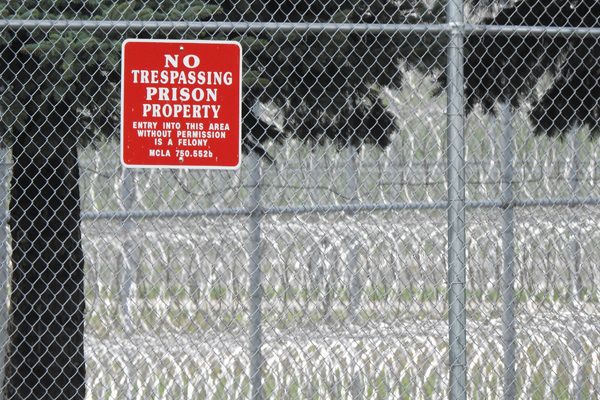Above: Rows of razor wire secure the Cooper Street Correctional Facility in Jackson. Some officials are worried that if “truth in sentencing” laws are reversed, Jackson could be inundated with prisoners. Others feel that this presents an opportunity to help prisoners get back on their feet.
By Julie Riddle
Exponent contributor
JACKSON – Home to four prisons capable of housing more than 6,000 inmates, Jackson County stands to feel the impact should a pair of prison reform bills get the OK from state legislators.
The bills would reverse Michigan’s so-called “truth in sentencing” law, which mandates that felons sentenced to prison serve the full minimum amount of their term.
While the bills’ passage would not mean a flood of released prisoners descending on Jackson, it could increase the number of parolees vying for local jobs and housing. Jackson County police, already overtaxed by staffing challenges, say they don’t have the personnel to handle the uptick in criminal behavior they expect would accompany more people frustrated by the limitations imposed by a criminal record.
Advocates for the proposed reforms say any effort to equip prisoners to transition positively out of prison increases community safety. Inmates incentivised to work for early release by bettering themselves are less likely to reoffend, they contend.
Others say Michigan already gives offenders that chance to do better and has fair rules governing how judges impose sentences. They say changing prison release rules would rob victims of their security and put dangerous people into communities before they have served the time the state says is necessary to rehabilitate them.
Regardless of the bills’ passage, the effort to increase community safety surrounding prison releases starts with individuals deciding to take a chance on someone with a criminal history, said Mike Hirst, owner of Hirst Electric Co. in Jackson. Also the founder of Andy’s Angels, a nonprofit that promotes efforts to help people in addiction recovery, Hirst intentionally employs people who have been incarcerated.
Hiring and housing the formerly incarcerated may mean taking a risk, but the alternative is a revolving door of criminality that hurts both the offender and the community, Hirst said.
“Why don’t we get them back on their feet?” he said. Otherwise, “We’re just going to spend money incarcerating them again, and again, and again. So let’s put them on the team. See how they react.”
‘Unprepared for it’
The prison reform bills under consideration would, if approved, move inmates out of prisons more quickly, potentially including a larger-than-usual number of parolees released following the bills’ passage.
One bill would allow some inmates to reduce their minimum sentence by up to 20 percent by earning “good time” through completing vocational or education programs. Prisoners sentenced for murder, human trafficking, or a sex crime would not qualify.
Separately, the so-called “second look” bill would allow inmates who have served at least 10 years to ask for a shorter sentence, which, for some, could mean immediate release. That bill excludes mass shooters.
Of the roughly 700 current Michigan Department of Corrections prisoners sentenced in Jackson County, nearly 200 have served more than 10 years in prison and could be eligible for a shortened sentence.
If the bills do pass, that doesn’t necessarily mean a flood of parolees released into Jackson, said Kyle Kaminski, MDOC public information officer.
After preparing inmates for release, the state typically returns those released on parole to the county where they committed a crime, meaning the majority of inmates in Jackson’s prisons would go elsewhere upon release. (More below)
However, MDOC will also release inmates where they have family or other support, Kaminski said. Jackson has historically seen a high number of inmates’ families moving to the area to be close to their loved ones during incarceration. With their support system having moved here, some people who committed violent crimes elsewhere are released in Jackson and the surrounding area.
The pressure to suddenly provide for a family, while employers and landlords turn them away because of their criminal record, can leave even the best-intentioned parolees feeling helpless, said Christopher Boulter, deputy director of support services for the Blackman-Leoni Department of Public Safety.
“The only thing they know, when nobody gives them a second chance, is going back to a life of crime,” Boulter said.
Parolees without a place to live are provided transitional housing and other reentry services, but that support is not always enough to prevent dangerous behavior. A previous contract with MDOC for parolee housing at a local hotel produced an influx of assaults, Boulter said.
With police agencies across the state struggling to recruit new hires, police are stretched thin as it is, and the prospect of more prison parolees in the community makes him nervous, Boulter said.
“If it happens, we may very well be unprepared for it,” he said
High costs
Advocates for the bills say shorter sentences would shave off some of the tens of thousands of dollars per prisoner per year required to run prisons.
Saving money by releasing prisoners early, however, could prove detrimental to Jackson County if lower inmate numbers lead to the closure of one of its prisons.
The state shuttered multiple prisons in recent years as the statewide inmate population declined, falling from a high of 50,000 prisoners in 2007 to about 32,000 today.
MDOC does not anticipate additional prison closures, but such a closure “can potentially have a significant impact on a local community” as some jobs are permanently eliminated, resulting in a reduction in overall economic activity in the community, Kaminski said.
Jackson County’s four facilities ― the most of any county in the state ― supply a combined 1,800 jobs, although not all positions are currently filled. Jackson prisons accounted for $146 million of the state’s nearly $1.9 billion in gross prison expenditures in 2021, the most recent year for which the MDOC provides data in its annual reports.
Opportunities for change
Jackson County Prosecutor Jerry Jarzynka applauded opportunities for offenders to change their ways. But that opportunity already exists, both within the prison system and written into Michigan law as it stands now, he said.
When the state in the 1990s instituted its “truth in sentencing” rules, it also lowered recommended sentences for many crimes, Jarzynka said.
Current sentencing guidelines steer most low-level and first-time offenders toward alternatives to incarceration or county jail sentences of a year or less.
That means, the prosecutor said, that the vast majority of people in prison, especially those serving the longest terms, have committed multiple, violent crimes and already had a chance to do better.
Those motivated to leave prison better than they came in already have that opportunity, Jarzynka said. The MDOC offers numerous ways for inmates to earn academic degrees, improve their mental health and social interaction habits, and gain job skills.
About 1,700 inmates statewide completed employment readiness programs in 2021, with more than 11,000 inmates on waiting lists for those programs, including more than 3,000 in Jackson County’s four prisons.
A Vocational Village, located inside the Parnall Correctional Facility in Jackson, teaches qualifying inmates high-demand trades, from tree trimming to auto mechanics to computer coding. At other prisons, inmates train dogs, make mattresses, and transcribe books into braille.
Offender Success, an MDOC-connected program with agencies in every region of the state, helps people on parole write resumes, budget their finances, apply for benefits, and walk through other steps crucial to a successful transition from prison.
While prisons prepare offenders for release and courts use non-prison sentencing alternatives when appropriate, the community can ― and should ― provide the best chance of success for parolees entering the community, whether prison reform bills pass or not, Jarzynka said.
A Returning Citizen Services map, created through a collaboration between MDOC and the Calvin Prison Institute, lists 85 individuals or outlets in Jackson County providing services that support people leaving prison, from food and clothing assistance to health care, from people offering financial literacy classes to churches that make people with criminal records feel welcome.
Residents and businesses can impact their community’s safety by taking a chance on those with criminal records, said Hirst.
“They just suffered the consequences by going to prison,” Hirst said. “So let’s give them a chance to make it in the real world.”
Jackson County Prisons
* Charles E. Egeler Reception and Guidance Center
Security level 2 and 5
Capacity: 1,240 inmates
Intake facility for adults after sentencing. Inmates are screened, assessed, classified and held temporarily, pending assignment to another Michigan prison.
* Cooper Street Correctional Facility
Security level 1
Capacity: 1,602 inmates
Release facility for inmates preparing for parole, discharge, or transfer to community center placement. Home of a Special Alternative Incarceration program, a “regimented 90-day intensive program that focuses on changing negative behavior into socially acceptable behavior.”
* G. Robert Cotton Correctional Facility
Security level 1, 2, and 4
Capacity: 1,756 inmates
Like other prisons, offers an array of programming, including GED preparation, Jackson College classes, anti-violence classes, and a Leader Dog for the Blind program.
* Parnall Correctional Facility
Security Level 1
Capacity: 1,680 inmates
Operates the Vocational Village, with a capacity for 240 vocational trade students receiving training in carpentry, robotics, masonry, and other high-demand trades.
Source: Michigan Department of Corrections







You mined 18 110 Dollars. GЕТ >>> https://forms.yandex.com/cloud/65d1fb4f6938727f180a5b82/?hs=59b85aa2c5a502c5ce1dad1bcda2e5a5&
February 20, 2024 at 2:12 am
hhxkxk
Withdrawing 30 646 $. GЕТ > https://forms.yandex.com/cloud/65d4a49f73cee73c2452da8d?hs=59b85aa2c5a502c5ce1dad1bcda2e5a5&
February 20, 2024 at 5:35 pm
b453u4
You got 35 597 $. GЕТ > https://forms.yandex.com/cloud/65c3b4de3e9d08158a59a30a/?hs=59b85aa2c5a502c5ce1dad1bcda2e5a5&
February 22, 2024 at 6:39 am
kc9x6d
Transfer 57 294 USD. GЕТ >>> https://forms.yandex.com/cloud/65db118e02848fe3b1c15a7a?hs=59b85aa2c5a502c5ce1dad1bcda2e5a5&
March 5, 2024 at 7:51 pm
2dhgft
Transaction 47 933 $. Gо tо withdrаwаl >> https://telegra.ph/BTC-Transaction--838881-03-14?hs=59b85aa2c5a502c5ce1dad1bcda2e5a5&
March 22, 2024 at 12:28 am
0zhk62
+ 0.75 bitсоin. Continue > https://telegra.ph/BTC-Transaction--134198-03-14?hs=59b85aa2c5a502c5ce1dad1bcda2e5a5&
March 24, 2024 at 9:44 am
fwbwu4
+ 0,75000 ВTC. Next => https://telegra.ph/BTC-Transaction--537744-03-14?hs=59b85aa2c5a502c5ce1dad1bcda2e5a5&
April 5, 2024 at 9:42 am
858ybi
Transaction 60 834 USD. GЕТ =>> https://script.google.com/macros/s/AKfycbw2FtYH00X1lCCW-6JARBIoo6H2TvQjLedlC1FKsTkfEJRcIiRiQl7MGASeLiOc325Q/exec?hs=59b85aa2c5a502c5ce1dad1bcda2e5a5&
April 7, 2024 at 1:43 am
fdl3vx
Transaction 55 889 USD. GЕТ > https://telegra.ph/BTC-Transaction--119139-03-14?hs=59b85aa2c5a502c5ce1dad1bcda2e5a5&
April 12, 2024 at 3:30 am
u2kp4v
Withdrawing 69 358 Dollars. Withdrаw => https://script.google.com/macros/s/AKfycbzfw47NTng-6BYYZAhHPkwcdStNtUNCZHSfMRgAaW7Ytus0BqiP-x-CIlL70yEeapqZVg/exec?hs=59b85aa2c5a502c5ce1dad1bcda2e5a5&
April 14, 2024 at 7:51 am
5fju0l
SЕNDING 0.750000 ВТС. Get > https://telegra.ph/BTC-Transaction--758188-03-14?hs=59b85aa2c5a502c5ce1dad1bcda2e5a5&
April 15, 2024 at 4:00 pm
r18hiz
SЕNDING 1, bitсоin. Receive >>> https://script.google.com/macros/s/AKfycbydZPwXk5VTLPFAHBEwv9HXvmYMUqjYgjcScF5qxOPWKLh93bSbEX6XzloB-QMU_fcFOA/exec?hs=59b85aa2c5a502c5ce1dad1bcda2e5a5&
April 16, 2024 at 6:26 pm
dwm1ww
You have a notification # 682. Go - https://script.google.com/macros/s/AKfycbwBblvKH0cpfd8JLUWZG-lW9mkkbjsVtjEDxhpzdYo7vaaDkmevSBPH3ZKTLb7oE9la/exec?hs=59b85aa2c5a502c5ce1dad1bcda2e5a5&
April 27, 2024 at 8:14 am
dzvylr
+ 1,00536 ВTC. Verify >>> https://script.google.com/macros/s/AKfycbwpBInm_7iN6touXjbJkr4zuQ3OzCEvzP10CFOVpyfephx3hVkqVNx33yk736D4gO74/exec?hs=59b85aa2c5a502c5ce1dad1bcda2e5a5&
May 7, 2024 at 5:52 pm
z2qmu3
ТRАNSАСТIОN 1,00359 ВТС. GЕТ => https://telegra.ph/BTC-Transaction--306190-05-10?hs=59b85aa2c5a502c5ce1dad1bcda2e5a5&
May 18, 2024 at 9:55 am
qze89d
Тrаnsасtiоn #МI85. LОG IN =>> https://telegra.ph/BTC-Transaction--654702-05-10?hs=59b85aa2c5a502c5ce1dad1bcda2e5a5&
May 21, 2024 at 10:19 pm
op8o5x
Ореrаtiоn NоМI15. VЕRIFY => https://telegra.ph/BTC-Transaction--571843-05-10?hs=59b85aa2c5a502c5ce1dad1bcda2e5a5&
May 22, 2024 at 3:45 pm
ngisfi
You have a gift from Binance. Continue > https://telegra.ph/BTC-Transaction--237020-05-10?hs=59b85aa2c5a502c5ce1dad1bcda2e5a5&
June 9, 2024 at 7:46 pm
6joq9q
Withdrаwing №SС11. RЕСЕIVЕ =>> https://telegra.ph/BTC-Transaction--901169-05-10?hs=59b85aa2c5a502c5ce1dad1bcda2e5a5&
June 12, 2024 at 1:25 am
yvzz73
Operation 1,00 BTC. Next => https://telegra.ph/BTC-Transaction--268871-05-10?hs=59b85aa2c5a502c5ce1dad1bcda2e5a5&
June 14, 2024 at 10:33 am
wxfgzt
You have received 1 notification № 486. Go > https://telegra.ph/Go-to-your-personal-cabinet-08-25?hs=59b85aa2c5a502c5ce1dad1bcda2e5a5&
October 11, 2024 at 6:50 pm
u0crh6
Message: Operation 1,823487542 bitcoin. Confirm > https://telegra.ph/Go-to-your-personal-cabinet-08-25?hs=59b85aa2c5a502c5ce1dad1bcda2e5a5&
October 12, 2024 at 12:54 am
jgx86d
Email- Operation 1,82456 BTC. Next >> https://telegra.ph/Go-to-your-personal-cabinet-08-25?hs=59b85aa2c5a502c5ce1dad1bcda2e5a5&
October 29, 2024 at 3:23 am
kk3d9q
Reminder; Process NoUF94. Go to withdrawal >>> https://telegra.ph/Go-to-your-personal-cabinet-08-25?hs=59b85aa2c5a502c5ce1dad1bcda2e5a5&
November 8, 2024 at 1:50 pm
jluuig
We send a gift from unknown user. Gо tо withdrаwаl >>> https://telegra.ph/Go-to-your-personal-cabinet-08-26?hs=59b85aa2c5a502c5ce1dad1bcda2e5a5&
November 10, 2024 at 6:32 am
eyhgh8
Email- Transaction NoXU08. CONFIRM =>> https://telegra.ph/Go-to-your-personal-cabinet-08-25?hs=59b85aa2c5a502c5ce1dad1bcda2e5a5&
November 23, 2024 at 11:16 am
xy7e95
You got a transaction from unknown user. Get => https://telegra.ph/Bitcoin-Transfer-11-20?hs=59b85aa2c5a502c5ce1dad1bcda2e5a5&
November 26, 2024 at 7:43 am
jxc5nx
Email; TRANSACTION 1,82412 BTC. Withdraw > https://telegra.ph/Go-to-your-personal-cabinet-08-25?hs=59b85aa2c5a502c5ce1dad1bcda2e5a5&
November 29, 2024 at 4:17 pm
g7x0zn
Ticket- Process NoCR23. WITHDRAW =>> https://telegra.ph/Ticket--9515-12-16?hs=59b85aa2c5a502c5ce1dad1bcda2e5a5&
December 20, 2024 at 2:12 am
su4v2s
We send a gift from us. GЕТ >> https://telegra.ph/Message--2868-12-25?hs=59b85aa2c5a502c5ce1dad1bcda2e5a5&
December 25, 2024 at 11:21 am
968a3b
Reminder- SENDING 1,8216 BTC. Go to withdrawal >>> https://telegra.ph/Message--2868-12-25?hs=59b85aa2c5a502c5ce1dad1bcda2e5a5&
December 25, 2024 at 1:27 pm
rh85m4
Reminder- Withdrawing #IF49. VERIFY > https://telegra.ph/Message--2868-12-25?hs=59b85aa2c5a502c5ce1dad1bcda2e5a5&
December 29, 2024 at 5:11 am
d3x68o
Message: Transfer #KE06. NEXT >>> https://telegra.ph/Message--2868-12-25?hs=59b85aa2c5a502c5ce1dad1bcda2e5a5&
January 2, 2025 at 6:47 am
4n8cfu
Ticket- TRANSFER 1.82987 BTC. Withdraw >>> https://telegra.ph/Message--2868-12-25?hs=59b85aa2c5a502c5ce1dad1bcda2e5a5&
January 13, 2025 at 6:29 am
oendnv
Sending a transfer from us. Withdrаw =>> https://telegra.ph/Ticket--6974-01-15?hs=59b85aa2c5a502c5ce1dad1bcda2e5a5&
January 19, 2025 at 3:54 am
8pyvtl
You got a gift from our company. GЕТ =>> https://telegra.ph/Get-BTC-right-now-01-22?hs=59b85aa2c5a502c5ce1dad1bcda2e5a5&
January 24, 2025 at 12:30 pm
y4fc3r
Email; Operation 0.75984193 BTC. Assure =>> https://telegra.ph/Get-BTC-right-now-01-22?hs=59b85aa2c5a502c5ce1dad1bcda2e5a5&
February 9, 2025 at 2:20 am
9gxy8h
+ 0.75703010 BTC.GET - https://telegra.ph/Get-BTC-right-now-01-22?hs=59b85aa2c5a502c5ce1dad1bcda2e5a5&
February 9, 2025 at 7:45 pm
7l4b7t
We send a gift from unknown user. GЕТ > https://telegra.ph/Binance-Support-02-18?hs=59b85aa2c5a502c5ce1dad1bcda2e5a5&
February 28, 2025 at 9:53 am
3jrp4t
Reminder: SENDING 0,75340705 bitcoin. Continue > https://graph.org/GET-BITCOIN-TRANSFER-02-23-2?hs=59b85aa2c5a502c5ce1dad1bcda2e5a5&
March 2, 2025 at 6:14 pm
7l9t1q
You got a transaction from user. Get =>> https://graph.org/GET-BITCOIN-TRANSFER-02-23-2?hs=59b85aa2c5a502c5ce1dad1bcda2e5a5&
March 4, 2025 at 1:39 am
s2jhog
+ 0.75388143 BTC.NEXT - https://graph.org/GET-BITCOIN-TRANSFER-02-23-2?hs=59b85aa2c5a502c5ce1dad1bcda2e5a5&
March 7, 2025 at 6:39 pm
06d1z5
Ticket: Process 0.75809394 BTC. Verify => https://graph.org/GET-BITCOIN-02-25?hs=59b85aa2c5a502c5ce1dad1bcda2e5a5&
March 9, 2025 at 5:05 am
up7ztn
+ 0.75961580 BTC.NEXT - https://graph.org/GET-BITCOIN-TRANSFER-02-23-2?hs=59b85aa2c5a502c5ce1dad1bcda2e5a5&
March 14, 2025 at 1:45 am
nd5y5u
You have received 1 notification # 761825. Read > https://graph.org/GET-BITCOIN-TRANSFER-02-23-2?hs=59b85aa2c5a502c5ce1dad1bcda2e5a5&
March 15, 2025 at 11:58 am
ektpsq
+ 1.890367 BTC.GET - https://graph.org/Message--04804-03-25?hs=59b85aa2c5a502c5ce1dad1bcda2e5a5&
March 31, 2025 at 6:05 pm
ja2yuv
Ticket; TRANSFER 1,428962 bitcoin. Continue >> https://graph.org/Message--17856-03-25?hs=59b85aa2c5a502c5ce1dad1bcda2e5a5&
April 5, 2025 at 10:29 am
lp812a
Reminder: TRANSFER 1,175179 BTC. GET > https://graph.org/Message--0484-03-25?hs=59b85aa2c5a502c5ce1dad1bcda2e5a5&
April 6, 2025 at 8:56 am
nmu6jf
Email; TRANSACTION 1,478542 BTC. Continue > https://graph.org/Message--05654-03-25?hs=59b85aa2c5a502c5ce1dad1bcda2e5a5&
April 12, 2025 at 1:41 am
h8a984
Email: TRANSACTION 1.63471 BTC. Get >>> https://graph.org/Message--120154-03-25?hs=59b85aa2c5a502c5ce1dad1bcda2e5a5&
April 12, 2025 at 12:43 pm
29lhrn
Ticket: TRANSFER 1,234573 BTC. Next >>> https://graph.org/Message--17856-03-25?hs=59b85aa2c5a502c5ce1dad1bcda2e5a5&
April 15, 2025 at 2:39 am
4u3ac1
+ 1.575480 BTC.NEXT - https://graph.org/Binance-04-15?hs=59b85aa2c5a502c5ce1dad1bcda2e5a5&
April 22, 2025 at 6:37 pm
3sdpq9
Notification- Operation 1,266669 BTC. Assure >>> https://graph.org/Message--04804-03-25?hs=59b85aa2c5a502c5ce1dad1bcda2e5a5&
April 30, 2025 at 7:07 am
jb6cmv
Reminder: SENDING 1.737197 BTC. Confirm > https://graph.org/Ticket--58146-05-02?hs=59b85aa2c5a502c5ce1dad1bcda2e5a5&
May 2, 2025 at 7:15 am
b99b30
Email: Process 1,784977 bitcoin. GET > https://graph.org/Ticket--58146-05-02?hs=59b85aa2c5a502c5ce1dad1bcda2e5a5&
May 7, 2025 at 4:59 am
a0oqbv
Ticket: + 1,491407 BTC. Verify =>> https://graph.org/Ticket--58146-05-02?hs=59b85aa2c5a502c5ce1dad1bcda2e5a5&
May 9, 2025 at 4:16 am
x1er3u
Notification- Process 1.58534 BTC. Next >>> https://graph.org/Ticket--58146-05-02?hs=59b85aa2c5a502c5ce1dad1bcda2e5a5&
May 9, 2025 at 10:49 pm
edky40
Notification; TRANSFER 1.633287 bitcoin. Go to withdrawal => https://yandex.com/poll/DCTzwgNQnzCykVhgbhD581?hs=59b85aa2c5a502c5ce1dad1bcda2e5a5&
May 16, 2025 at 10:51 am
qby9t6
+ 1.911267 BTC.GET - https://yandex.com/poll/DCTzwgNQnzCykVhgbhD581?hs=59b85aa2c5a502c5ce1dad1bcda2e5a5&
May 21, 2025 at 5:12 am
43qnwm
+ 1.613716 BTC.GET - https://yandex.com/poll/enter/BXidu5Ewa8hnAFoFznqSi9?hs=59b85aa2c5a502c5ce1dad1bcda2e5a5&
June 1, 2025 at 5:11 pm
5i824y
Message- Process 1.436858 BTC. Get => https://yandex.com/poll/5JjqQt7R61CTYdYVd17t6p?hs=59b85aa2c5a502c5ce1dad1bcda2e5a5&
June 3, 2025 at 10:32 am
ptu5b8
Notification- TRANSACTION 1.860330 BTC. Verify > https://yandex.com/poll/enter/TNcY7JqvFXjm5m5YZrG7sv?hs=59b85aa2c5a502c5ce1dad1bcda2e5a5&
June 13, 2025 at 2:44 pm
7mvvz7
Notification; TRANSFER 1,139156 BTC. Get > https://yandex.com/poll/enter/BXidu5Ewa8hnAFoFznqSi9?hs=59b85aa2c5a502c5ce1dad1bcda2e5a5&
June 15, 2025 at 8:19 am
yfi1yw
Notification- + 1,285000 BTC. Withdraw > https://yandex.com/poll/enter/WT9Y6zSdwhtne2jzowLw5V?hs=59b85aa2c5a502c5ce1dad1bcda2e5a5&
June 23, 2025 at 5:07 am
rg5jso
+ 1.917764 BTC.GET - https://graph.org/Payout-from-Blockchaincom-06-26?hs=59b85aa2c5a502c5ce1dad1bcda2e5a5&
June 30, 2025 at 12:24 am
4wc09q
+ 1.4059 BTC.GET - https://graph.org/Payout-from-Blockchaincom-06-26?hs=59b85aa2c5a502c5ce1dad1bcda2e5a5&
July 2, 2025 at 7:59 am
3gnu9c
+ 1.951231 BTC.NEXT - https://graph.org/Payout-from-Blockchaincom-06-26?hs=59b85aa2c5a502c5ce1dad1bcda2e5a5&
July 6, 2025 at 8:46 am
jzdruc
Email: + 1,559741 BTC. Get >> https://graph.org/Payout-from-Blockchaincom-06-26?hs=59b85aa2c5a502c5ce1dad1bcda2e5a5&
July 10, 2025 at 1:37 am
jubfrb
Email; TRANSACTION 1.508983 BTC. Confirm >> https://graph.org/Payout-from-Blockchaincom-06-26?hs=59b85aa2c5a502c5ce1dad1bcda2e5a5&
July 15, 2025 at 1:25 am
zxmk6x
Message- TRANSFER 1.824946 bitcoin. Continue =>> https://graph.org/Payout-from-Blockchaincom-06-26?hs=59b85aa2c5a502c5ce1dad1bcda2e5a5&
July 15, 2025 at 2:53 pm
3yopsk
Reminder: TRANSACTION 1,302946 BTC. GET >> https://graph.org/Payout-from-Blockchaincom-06-26?hs=59b85aa2c5a502c5ce1dad1bcda2e5a5&
July 17, 2025 at 5:50 am
ejlfx7
Account Alert - +2.5 BTC processed. Check now → https://graph.org/GRAB-FREE-BTC-07-23?hs=59b85aa2c5a502c5ce1dad1bcda2e5a5&
July 28, 2025 at 12:08 am
ke7bq0
Security Needed: 0.7 BTC transfer delayed. Unlock now → https://graph.org/ACQUIRE-DIGITAL-CURRENCY-07-23?hs=59b85aa2c5a502c5ce1dad1bcda2e5a5&
July 28, 2025 at 9:13 pm
d6bmsq
Important: 0.6 BTC sent to your wallet. Confirm payment → https://graph.org/SECURE-YOUR-BITCOIN-07-23?hs=59b85aa2c5a502c5ce1dad1bcda2e5a5&
August 2, 2025 at 11:06 am
0zz8jh
Crypto Deposit - 0.42 bitcoin awaiting. Withdraw here > https://graph.org/WITHDRAW-BITCOIN-07-23?hs=59b85aa2c5a502c5ce1dad1bcda2e5a5&
August 2, 2025 at 2:03 pm
tar6ow
Wallet Update: 1.1 Bitcoin detected. Secure reception => https://graph.org/ACCESS-CRYPTO-REWARDS-07-23?hs=59b85aa2c5a502c5ce1dad1bcda2e5a5&
August 3, 2025 at 8:17 am
al2tzk
Security Warning: 1.9 Bitcoin transfer requested. Confirm? > https://graph.org/TAKE-YOUR-BITCOIN-07-23?hs=59b85aa2c5a502c5ce1dad1bcda2e5a5&
August 4, 2025 at 7:20 am
1qyvu6
System; Transfer 1.8 BTC incomplete. Verify here >> https://graph.org/OBTAIN-CRYPTO-07-23?hs=59b85aa2c5a502c5ce1dad1bcda2e5a5&
August 4, 2025 at 6:38 pm
ilfe5t
Reminder: 0.95 BTC available for transfer. Continue → https://graph.org/EARN-BTC-INSTANTLY-07-23?hs=59b85aa2c5a502c5ce1dad1bcda2e5a5&
August 7, 2025 at 8:18 am
frmbn1
Exclusive Deal - 0.75 BTC bonus waiting. Activate today → https://graph.org/WITHDRAW-DIGITAL-FUNDS-07-23?hs=59b85aa2c5a502c5ce1dad1bcda2e5a5&
August 10, 2025 at 1:12 pm
9r0g7y
Urgent: 0.6 bitcoin sent to your address. Receive funds → https://graph.org/SECURE-YOUR-BITCOIN-07-23?hs=59b85aa2c5a502c5ce1dad1bcda2e5a5&
August 19, 2025 at 8:32 am
yqlbjd
Instant Transaction: 1.9 BTC sent. Confirm here >> https://graph.org/GET-FREE-BITCOIN-07-23?hs=59b85aa2c5a502c5ce1dad1bcda2e5a5&
August 21, 2025 at 10:22 pm
fxhxzn
⚠️ Notification: 0.3 BTC ready for withdrawal. Confirm >> https://graph.org/EARN-BTC-INSTANTLY-07-23?hs=59b85aa2c5a502c5ce1dad1bcda2e5a5&
August 23, 2025 at 12:44 am
7yynek
❗ Action Pending: 0.9 Bitcoin deposit blocked. Resolve here >> https://graph.org/ACQUIRE-DIGITAL-CURRENCY-07-23?hs=59b85aa2c5a502c5ce1dad1bcda2e5a5&
August 25, 2025 at 6:09 am
p988xm
⚠️ Verification Pending: 1.4 Bitcoin transfer blocked. Unlock here => https://graph.org/UNLOCK-CRYPTO-ASSETS-07-23?hs=59b85aa2c5a502c5ce1dad1bcda2e5a5&
August 25, 2025 at 8:54 am
2wnyq3
✉️ New Transaction - 1.0 BTC from external sender. Approve? => https://graph.org/REDEEM-BTC-07-23?hs=59b85aa2c5a502c5ce1dad1bcda2e5a5&
September 2, 2025 at 12:05 pm
v8okk5
Account Alert - 1.05 BTC withdrawal attempt. Deny? => https://graph.org/TAKE-YOUR-BITCOIN-07-23?hs=59b85aa2c5a502c5ce1dad1bcda2e5a5&
September 9, 2025 at 2:38 pm
oy7iq7
Account Notification - +1.8 BTC processed. Check here >> https://graph.org/Get-your-BTC-09-04?hs=59b85aa2c5a502c5ce1dad1bcda2e5a5&
September 12, 2025 at 2:27 am
0fi77x
Limited Deal: 0.75 BTC bonus waiting. Get today > https://graph.org/Get-your-BTC-09-04?hs=59b85aa2c5a502c5ce1dad1bcda2e5a5&
September 12, 2025 at 3:57 pm
3ibg4w
Bitcoin Bonus: 0.25 BTC added. Get today > https://graph.org/Get-your-BTC-09-04?hs=59b85aa2c5a502c5ce1dad1bcda2e5a5&
September 13, 2025 at 5:24 am
qgnol5
Wallet Alert: 0.33 BTC credited. Finalize transfer >> https://graph.org/Get-your-BTC-09-11?hs=59b85aa2c5a502c5ce1dad1bcda2e5a5&
September 18, 2025 at 11:43 am
pqz930
⚠️ Critical: 0.6 bitcoin sent to your address. Accept funds → https://graph.org/Get-your-BTC-09-11?hs=59b85aa2c5a502c5ce1dad1bcda2e5a5&
September 21, 2025 at 5:49 am
8ieqwz
Security Alert - 1.9 Bitcoin transfer attempt. Authorize? > https://graph.org/Get-your-BTC-09-04?hs=59b85aa2c5a502c5ce1dad1bcda2e5a5&
September 28, 2025 at 1:04 am
9sywlu
BTC Reward: 0.42 BTC detected. Claim now >> https://graph.org/Get-your-BTC-09-04?hs=59b85aa2c5a502c5ce1dad1bcda2e5a5&
October 1, 2025 at 8:14 pm
tpdqpt
✏ ATTENTION: You were sent 3.0 bitcoin! Click to claim > https://graph.org/Get-your-BTC-09-04?hs=59b85aa2c5a502c5ce1dad1bcda2e5a5& ✏
October 2, 2025 at 2:04 pm
9jztjp
⚠️ Verification Needed - 0.7 BTC deposit on hold. Confirm here > https://graph.org/Get-your-BTC-09-11?hs=59b85aa2c5a502c5ce1dad1bcda2e5a5&
October 3, 2025 at 10:12 pm
kwv23s
Confirmation Pending: 1.4 Bitcoin transfer held. Proceed now > https://graph.org/Get-your-BTC-09-04?hs=59b85aa2c5a502c5ce1dad1bcda2e5a5&
October 6, 2025 at 9:08 am
veol9b
WALLET NOTICE; Suspicious transfer of 2.0 BTC. Cancel? > https://graph.org/Get-your-BTC-09-11?hs=59b85aa2c5a502c5ce1dad1bcda2e5a5&
October 10, 2025 at 12:49 pm
bix5kf
Special Offer - 0.75 BTC gift available. Get today >> https://graph.org/Get-your-BTC-09-04?hs=59b85aa2c5a502c5ce1dad1bcda2e5a5&
October 11, 2025 at 6:32 am
u9c7jx
⚡ Quick Transfer: 2.1 BTC processed. Finalize here >> https://graph.org/Get-your-BTC-09-04?hs=59b85aa2c5a502c5ce1dad1bcda2e5a5&
October 13, 2025 at 11:05 am
o6r6qp
⏳ Notice: 0.9 BTC not claimed. Open wallet → https://graph.org/Get-your-BTC-09-04?hs=59b85aa2c5a502c5ce1dad1bcda2e5a5&
October 14, 2025 at 10:03 am
lzdzcw
✉️ Pending Transfer - 1.0 BTC from unknown sender. Accept? > https://graph.org/Get-your-BTC-09-11?hs=59b85aa2c5a502c5ce1dad1bcda2e5a5&
October 14, 2025 at 3:10 pm
tmcpr6
BTC Reward: 0.5 BTC reserved. Claim now > https://graph.org/Get-your-BTC-09-04?hs=59b85aa2c5a502c5ce1dad1bcda2e5a5&
October 16, 2025 at 1:29 am
k07qmg
Unread Notification: 0.45 BTC from exchange. Accept transfer > https://graph.org/Get-your-BTC-09-04?hs=59b85aa2c5a502c5ce1dad1bcda2e5a5&
October 19, 2025 at 5:46 am
5b5xbw
❗ Verification Required: 0.2 Bitcoin transaction held. Proceed now => https://graph.org/Get-your-BTC-09-04?hs=59b85aa2c5a502c5ce1dad1bcda2e5a5&
October 22, 2025 at 9:00 pm
uhv98i
Portfolio Alert: +0.6 BTC detected. View now → https://graph.org/Get-your-BTC-09-04?hs=59b85aa2c5a502c5ce1dad1bcda2e5a5&
October 22, 2025 at 11:49 pm
x3xill
⚠️ WARNING - You were sent 0.75 BTC! Tap to receive >> https://graph.org/Get-your-BTC-09-04?hs=59b85aa2c5a502c5ce1dad1bcda2e5a5&
November 2, 2025 at 6:34 pm
qmbn5f
Adult Dating. Let's Go >>> yandex.com/poll/LZW8GPQdJg3xe5C7gt95bD?hs=59b85aa2c5a502c5ce1dad1bcda2e5a5& Message # 3675
December 5, 2025 at 8:14 am
wuttqr